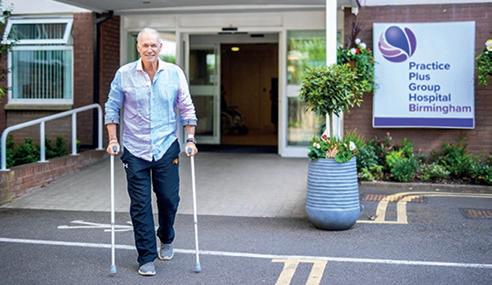
3 minute read
Party Conference Newbie hits Liverpool and Manchester
Liz Giles, Policy and Communications Director at the London Chamber of Commerce and Industry, shares her first experience of political party conferences
As a former broadcast journalist, my experience of political party conferences was limited to watching them unfold from a newsroom in London. Fast forward to now, and I’m on a train to Liverpool heading to the Labour Party Conference in person for the first time. I’ve attended many conferences over the years, but none quite like this - with protesters outside and airport-style security checks to enter the ‘secure zone’ at the ACC Liverpool. Thousands of delegates filled the

King’s Dock site overlooking the River Mersey, creating an atmosphere that was equal parts energetic and intense.
On Sunday afternoon, the London Chamber of Commerce hosted a panel discussion featuring our CEO, Karim Fatehi. He outlined how London’s business community can help deliver Labour’s growth mission, while emphasising that stability and certainty are essential to achieving it. With the Budget just weeks away, there is little doubt among businesses that any further tax increases would be highly detrimental to confidence and investment.
Armed with the official conference app, I scrolled through a packed four-day programme of main sessions and fringe events. Topics ranged from the skills gap and infrastructure policy to international trade and fraud. At one session with Lucy Rigby KC, Economic Secretary to the Treasury on the panel, there were joined calls for a stronger, better-resourced regulator to coordinate the national response to fraud and financial crime. On the main stage, speeches centred on economic growth, national renewal, diversity, and the fight against racism.
Beyond the headlines, Business Secretary Peter Kyle shared a personal account of being diagnosed with dyslexia in his twenties and how his time working with Anita Roddick at The Body Shop shaped his career outlook. Nearby, Chancellor Rachel Reeves struck a lighter tone, discussing pizza, red wine, and her enjoyment of the Raye song ‘Escapism’. Networking opportunities abounded, from the Heathrow Lounge, where I brushed shoulders with MPs, CEOs and parliamentary aides, to the more relaxed setting of RIBA North, where Liverpool City Region Metro Mayor Steve Rotheram made the case for ‘real devolution’.
With ‘Starmer 2.0’ in full swing, the Labour conference was clearly designed to project patriotism, fairness, and social justice, while countering divisive rhetoric. The party drew sharp lines between legal and illegal migration, focusing on protecting vulnerable people and tackling trafficking networks.
A week later, 35 miles up the M62 in Manchester, the mood shifted sharply, from centre-left optimism to centre-right realism, at the Conservative Party Conference. The city was on high alert following the horrific attack on a synagogue in Heaton Park, and the heightened security presence was unmistakable: concrete barriers and armed officers surrounded the venue.
Inside the ‘secure zone’, I walked past banners and screens that said ‘Stronger economy, stronger borders’. If Labour’s theme was growth, the Conservative’s was resilience in the face of economic challenge. Announcements aimed at tackling the UK’s ‘fiscal gloom’ included abolishing stamp duty on primary residences, scrapping business rates for high street shops and pubs, proposals to leave the ECHR, recruiting 10,000 new police officers, and launching funds for town centre regeneration and antisocial behaviour reduction.
Across the fringe sessions, concerns repeatedly surfaced about London’s global competitiveness. Kensington and Chelsea Council Leader Cllr Elizabeth Campbell warned that the capital risks losing long-term residents and high-value professionals to rival cities like Milan and New York. Gareth Bacon MP argued for targeted planning reforms - building homes where they’re needed most, not just where it’s easiest.
Logistics UK underscored the sector’s £170 billion contribution to the UK economy and its 8% share of the national workforce but also highlighted deep-rooted challenges.

Policy Director Kevin Green pointed to border friction, planning delays, inadequate driver facilities, and fragmented coordination between authorities as persistent barriers to growth.
At a forum on skills and education, Cllr Louise McKinlay of Brentwood and Hutton called for better alignment between employer needs and workforce capabilities. Speakers championed compressed highereducation models to speed up entry into the workforce and urged employers to take a more active role in schools beyond traditional careers advice.
While Labour’s conference in Liverpool focused on national renewal, fairness and inclusion, the Conservatives in Manchester centred their message on fiscal discipline, tax reform, and competitiveness. Both parties sought to demonstrate economic credibility ahead of the next Budget, but through strikingly different policy routes.
Liz Giles attended the Labour Party Conference, which was held from Sunday, September 28 to Wednesday, October 1, and the Conservative Party Conference, which was held from Sunday, October 5 to Wednesday, October 8.
Beyond the headlines, Business Secretary Peter Kyle shared a personal account of being diagnosed with dyslexia in his twenties and how his time working with Anita Roddick at The Body Shop shaped his career outlook. Nearby, Chancellor Rachel Reeves struck a lighter tone, discussing pizza, red wine, and her enjoyment of the Raye song ‘Escapism’.
Multi-Currency Business Account with 8 currencies.
Multi-Currency Business Account with 8 currencies.





Assign and Manage multiple cards under one business profile Virtual Card Support Linked to your commercial accounts Spend & Holdmultiplecurrencies
*Multi-Currency Business Debit Card is only available to UK-registered entities.











